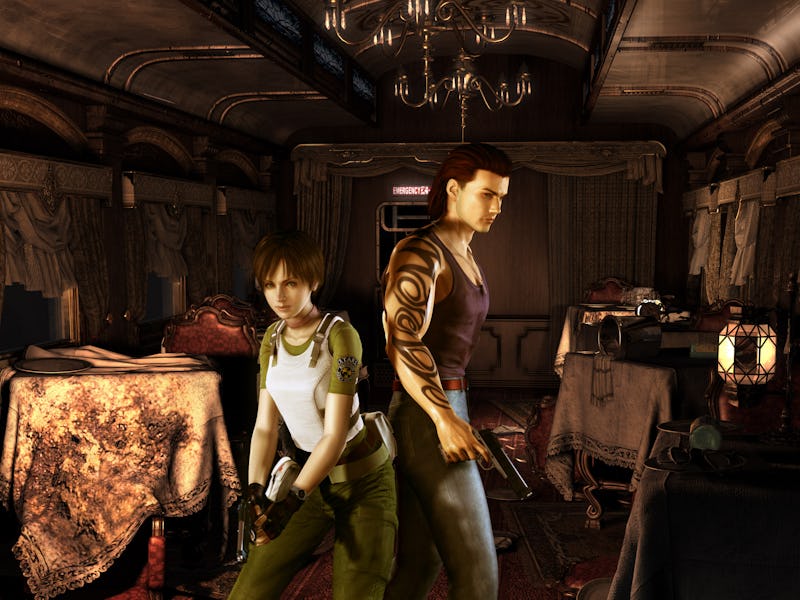Resident Evil 0 Is the Franchise at Its Best (and Worst)
A prequel filled with promise and problems.

By 2002, Resident Evil was at a crossroads. What began as a moody horror game set in the medium’s greatest haunted house started to become more action-oriented with every entry. While the likes of cult-classic Code: Veronica attempted to adhere to the horror origins of the franchise, it seemed Resident Evil, as a series, was itching to move on from its roots.
On the eve of the franchise's biggest evolution, Capcom turned back the clock with Resident Evil 0, which debuted on November 12, 2002. While the oft-forgotten prequel stands as a wonderful take on the tone and gameplay of the original Resident Evil, it is weighed down by a messy plot — infecting the original with the stain of its successors like the franchise’s dreaded T-Virus.
Resident Evil 0 puts horror first and makes interesting iterations on the original’s mechanics.
Resident Evil 0 centers around the S.T.A.R.S Bravo Team that Jill, Chris, and Wesker are sent to rescue at the beginning of the first Resident Evil. Over the course of roughly a dozen hours, it explains what befell Bravo team member Rebecca Chambers leading up to the events of Spencer Mansion.
Just like the narrative, the gameplay of Resident Evil 0 is linked closely to the first game. Action is de-emphasized in favor of mood and tension. Ammo is rarer, zombies are more dangerous, and it feels like something is hiding around every corner. In other words, it’s a horror game. This is due to the reliance on building player anticipation of bad things to come, which is paid off by Resident Evil 0’s ability to know exactly when to finally pull the trigger on a big scare to give it the fullest effect possible.
Resident Evil 0 even makes interesting improvements to the original Resident Evil’s core systems. First is the prequel’s take on inventory, which ditches the franchise's item boxes in favor of simply dropping things on the floor (which I can only assume is what inspired Starfield players to do the same). Yes, Resident Evil 0 wants the player to strategically choose when and where to leave items behind on the map. The only caveat is that you need to backtrack to get any important items — or another character can pick them up.
Plenty of Resident Evil games have built-in replayability through the inclusion of different routes, or slight variations on the game starring a different character. The original gave the option to play as Chris or Jill, meaning you needed to play twice to see everything. Resident Evil 0 instead combines two routes into the same playthrough. In addition to Chambers, you’re put in the shoes of newcomer Billy Coen and given the ability to switch between protagonists at will. The two protagonists can explore areas of the game separately or together, and the item drop system encourages thinking about dividing your resources so both can survive.
I don’t even know how to begin to explain who this person is to you.
Mechanically and tonally, Resident Evil 0 is the most interesting iteration of the franchise’s horror beginnings. It’s a shame the same can’t be said of the game’s narrative.
A prequel to Resident Evil was always going to be a Pandora’s box. Much of the original’s intrigue, suspense, and horror comes from its lack of explanation. You’re stranded in a spooky mansion with zombies and puzzles and offered this chilling challenge: to find a way out! The game eventually teases out a story of corporate greed with elements of sci-fi, but it’s a relatively simple plot with the ominous Umbrella Corporation looming menacingly over it all.
Subsequent entries would tack on new pieces of lore and become more complicated, more inscrutable, more... bloated. And while Resident Evil 0’s gameplay embraces the franchise’s roots, its narrative is burdened with the jumble of lore the series had turned into by 2002. Resident Evil 0’s largest impact is to entirely retcon the original game into the larger fabric of the series, placing it within the convoluted story of the Umbrella Corporation's frankly unintelligible history.
Two years after Resident Evil 0, Resident Evil 4 was released to the world in 2004. This marked the full transition into an action-first franchise. It would not return to a horror focus until 2017’s Resident Evil 7: Biohazard. But two decades on from Resident Evil 0, the flawed prequel is a time capsule to the series's biggest crossroads and hints at what could have been.